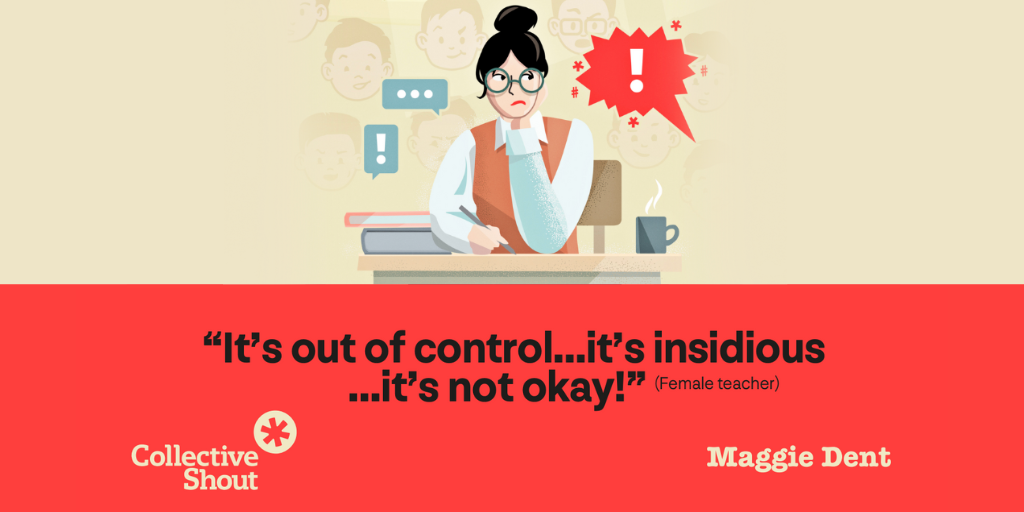IEU calls for action to tackle harassment of women teachers
The Sexual Harassment of Teachers (SHOT) Report has found harmful sexual behaviours are increasing in Australian schools, and women teachers often don’t feel safe at work.
Non-profit Collective Shout on the SHOT report
The IEU has called for urgent action to end such harassment and supported the report’s six recommendations, seeking immediate intervention from governments and school employers.
In the Term 3 edition of The Point, we reported on a new project from Monash University, funded by Australia’s National Research Organisation for Women’s Safety (ANROWS), which aims to establish ‘school-based programs to identify and tackle the harms of online misogyny and gender-based violence in schools’. It seems that study can’t come to fruition quickly enough.
IEU members are experiencing more verbal and physical attacks and intimidation. Experts confirm this behaviour is fuelled by online anti-feminist activists operating in the ‘manosphere’ – the subject of the Monash study. Co-researcher Dr Stephanie Wescott told the Herald Sun that Australian women teachers ‘have described an alarming increase in sexual harassment and other harmful behaviours by boys in classrooms, often linked to narratives and ideologies unmistakably derived from manosphere content’.
‘Manfluencers’ like Andrew Tate and Jordan Peterson have millions of followers, and social media challenges dare boys to act in misogynist or sexist ways. Recent incidents at ‘elite’ private schools have included boys singing a sexist chant on a tram, the circulation of lists of misogynist muck-up day pranks, and the ranking of female students based on their appearance.
ANROWS reports that women teachers across all sectors are seeking greater support and professional development to counter sexual misbehaviours by male students.
The SHOT report, based on responses from more than 1000 teachers, found ‘teachers – almost all female – reported being subjected to routine sexual harassment’.
‘They were propositioned, threatened with rape, subjected to sexist slurs and mimicking of sex acts seen in porn, and called the ‘c’ word. While trying to just do their jobs, they were sexually moaned, groaned, and grunted at, asked for nudes and intimidated. Many said they did not feel safe at work.’
Most of the teachers felt that their physical, mental and emotional safety were under threat.
‘The situation is at crisis point. Without radical action and intervention – and collective effort – the teaching profession will be decimated. Female teachers cannot tolerate turning up to school to be sexually harassed on a daily basis. It’s not what they signed up for.’
SHOT report findings:
46.9% experienced sexual harassment within a school environment
80.6% of teachers who experienced sexual harassment at school were harassed by a student
58.9% reported feeling unsafe in the classroom/school grounds following sexual harassment
79.9% reported an increase in sexualised behaviours in schools.
The SHOT report reminds us that teacher-targeted sexual harassment ‘is often overlooked or under-investigated’. One respondent said, ‘Parents need to acknowledge their child’s behaviour as it is by the law – sexual harassment. But they often ignore or excuse.’
Survey respondents emphasise the crucial role of parental involvement and proactive educational measures to address the behaviour and counter influences such as pornography and social media. The IEU has also reported on the cyberbullying of teachers with deepfake pornography by students.
Thankfully, new resources and training programs for non-government school teachers in Victoria are being rolled out to better equip teachers to support students navigating contemporary issues like consent, sextortion, pornography and gender-based bullying.
The resources were designed by education experts in consultation with teachers, students and parents. The national curriculum, along with many state education programs, now includes specific focus on consent and respectful relationships, making social media safer for students and making women’s lives safer. And hundreds of non-government schools have signed up to the Victorian government’s Respectful Relationships program.
Teaching resources and education programs are an important part of the solution, but school employers must also show clear leadership on these issues. Employers must take immediate and decisive action in response to any cases of harassment of school staff. There must be a policy of zero tolerance of harassing or worse behaviour in every workplace, and in every school.
Overworked teachers and school leaders will need more release time to fully engage with new curriculum materials, implement programs and participate in valuable professional development.
Nobody should be subjected to sexual harassment in their workplace, and sexual harassment of staff by students should never be tolerated or trivialised. If you have concerns about your working environment, contact your union!



